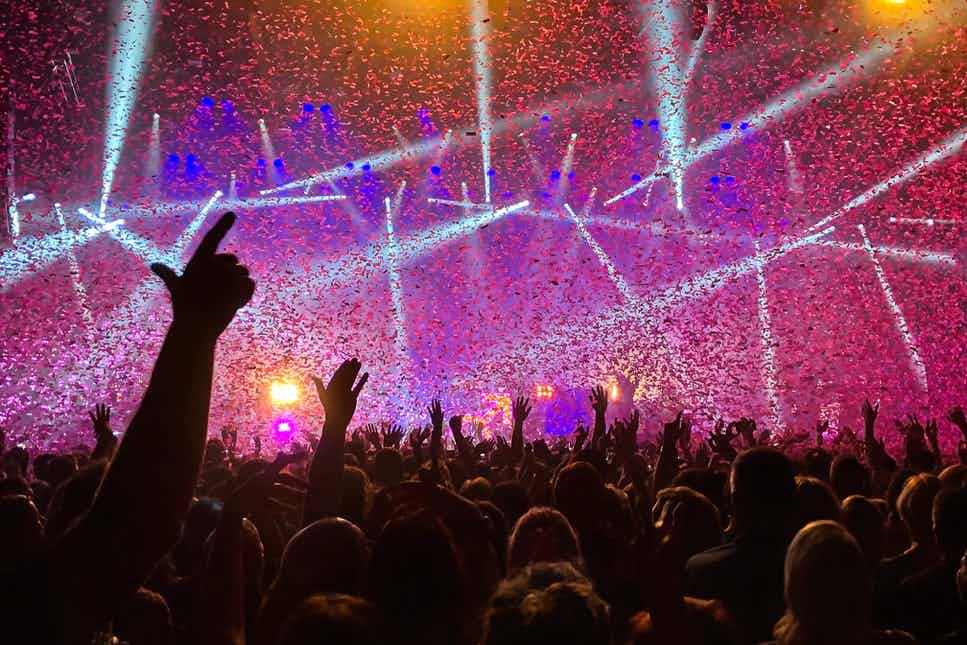We all know that the music scene has ground to a halt, for now.
But, let’s not think about that - let’s look forward to the return of gigs in all their loud and noisy glory.
It’s inevitable, maybe not today, or tomorrow, but soon - the summer of ‘21?! We hope so!
We’re all hoping for the live music scene to come back swinging - music is one of humanity’s finest inventions, a legacy that has been a significant part of our existence for some 40,000 years.
Music has been with us for a long time, so it’s perhaps unsurprising it has a profound effect on our mental and physical being - but how profound? It might just surprise you.
The effects of music are deep and diverse; it helps us alleviate our stress and anxiety, lowers our blood pressure, boosts our cognitive ability and motor skills and increases our general mood and wellbeing.
The quicker we get ourselves back out there into the world of music, the better!
Here are five reasons to get yourself out to a gig as soon as you possibly can.
1. Music stimulates our mood
Music is an important cultural entity, practice or activity, but it’s also part of our evolution, hardwired into our brains and bodies.
It was Darwin himself who first brought the subject of music into scientific debate. His famous observations of finches across the Galapagos revealed an intricate pattern of song that he hypothesised as crucial to the formation and maintenance of social bonds.
Darwin also believed that music played a crucial role in our early evolution as homo sapiens - this has come under close analysis in recent years - and it seems like he was right.
A raft of studies have sought to unravel the properties of music and our bodies, but perhaps none have been more influential than a study of music-induced dopamine release that provided concrete evidence of how music stimulates the brain in a way that rivals that of other evolutionary important activities.
The research found that dopamine - a crucial mood-enhancing chemical - is released into our brain when we listen to music. This can bolster our mood for the day, get us going in the morning, and boost our morale.
When combined with a live audience, louder noises, ambience and atmosphere, this effect is intensified to the point that live music becomes like an addiction - a fever or itch that we need to scratch - and it’s probably the healthiest addiction going!
2. Music reduces depression and anxiety
Music doesn’t just have a stimulative effect that boosts our mood; it can also level out our mood and ease feelings of depression, stress and anxiety.
Music has been used in a professional therapeutic capacity for decades. Scientific studies have revealed how music listening eases preoperative anxiety, even lessening the need for sedatives.
Large reductions in blood pressure have also been observed when listening to music. The average decrease in blood pressure for a group listening to music pre-operation was a staggering 35 mm Hg systolic and 24 mm Hg diastolic compared to a group sitting in silence.
Music therapy is also used to ease the symptoms of dementia and can stabilise the moods of those suffering from psychiatric illness. Classical music and jazz are amongst the most researched genres here and classical music concerts, in particular, have been linked to marked reductions in physical stress, both in the audience and in the musicians.
Any music you enjoy will likely trigger the same benefits.
Why?
Dopamine is likely to play a part, but oxytocin is probably the most critical chemical here, part-responsible for stress and pain reduction, happiness, warmth and feelings of bliss, peace or contentment.
Increased concentrations of these critical neurotransmitters kickstart a cascade of bodily processes that relax our arteries, slow our heart rates and improve our mood across the spectrum.
3. Music improves your thinking power
The ‘Mozart Effect’ is a well-known term coined to describe how music affects our thinking power. The original 1993 study found that listening to Mozart increases IQ test scores.
Today, we understand a lot more about how music improves our cognitive ability. Studies have shown how music helps us commit learning to memory; it boosts our social skills and makes us more gregarious and fluent in social situations. Musical experiences often become etched into our memory, never forgotten and sometimes cherished forever.
Many of these effects are taken to explain how live music fuses and bonds humans together.
From large-scale festivals to intimate local gigs, live music is a forum of social interaction that immerses us in the company of one another - and it’s been that way for thousands of years.
4. Music gets you moving
From the dance parties of the swingin’ 60s to the mosh pit of today, music gets the limbs moving, the head nodding and the foot tapping.
Live music events are excellent for our physical health, promoting movement and a natural form of full-body exercise. They give us a thorough work out in an environment that relaxes our muscles and supports our blood pressure, cardiac function and immune system.
Music has also been found to motivate us to do more exercise, improving our stamina and exercise output. Athletes listening to music can push themselves harder for longer.
Music also helps us coordinate movements, aiding our motor skills. Music therapy here has proved a potent tool in treating stroke victims, helping them improve their coordination and speech skills.
The same has been observed in those with Parkinson’s disease; dance classes help patients move in time with the rhythm of a musical beat.
All of us can capture some of these kinetic properties of music and live events are a superb way to get your body moving in a supportive environment for general health.
5. Music helps you live longer
With all these proven benefits of music, would it really be much of a stretch to suggest that it actually helps you live a longer life?
An O2-commissioned study found just that, noting how attendance of live music events specifically were linked positively with improved wellbeing and decreased mortality.
A Swedish study incidentally found that regular attendance of cultural events - including musical events - decreased mortality significantly versus those who rarely attended.
Still not convinced? Research overviewed by the Oxford Institute of Ageing noted how classical musicians and music lovers had a higher likelihood of living longer. A UCL study published in the BMJ found that those who engaged in the ‘receptive arts’ (e.g. going to live music events) could also often live significantly longer than those who didn’t immerse themselves in those sorts of events.
It all points to one thing; getting yourself out to a gig as and when you (we all) can. Music has been with us for 40,000 years, and it’s not going anywhere so long as humans walk the earth!









